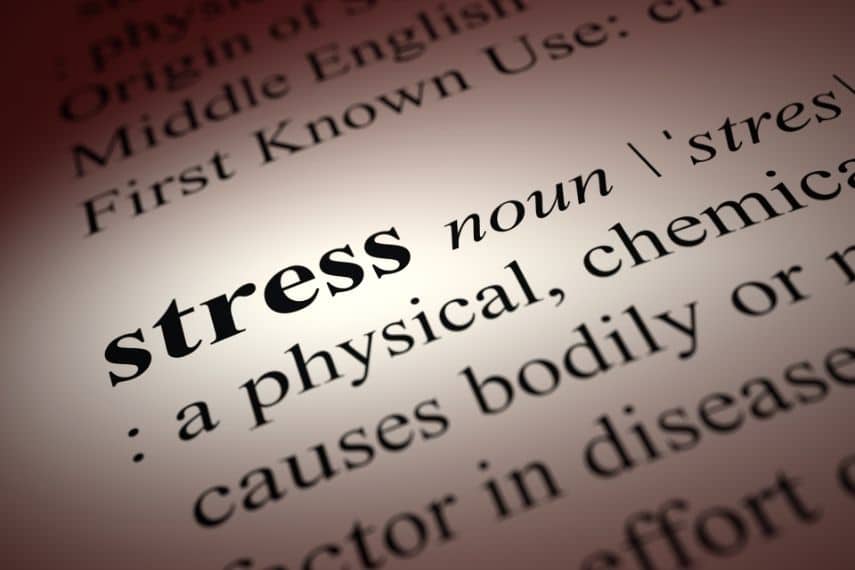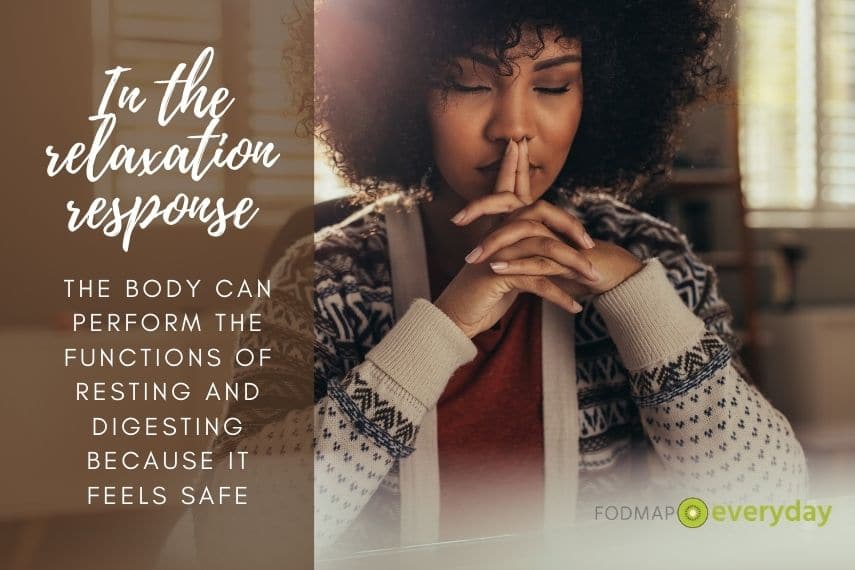There is a scientific basis for the connection between stress and Irritable Bowel Syndrome (IBS), but we probably didn’t need to tell you that. Those of us with IBS and following the low FODMAP diet have all had those experiences of stress exacerbating our IBS symptoms. Knowing the connection is there is a first step. Now, what can we do about it?
Isabelle Tierney, M.A., LMFT, is a licensed therapist and a stress management specialist who has created an approach she calls The Feel Good Life Methodology and we want to introduce you to her and her work.
And be sure to read her article IBS and Stress: Common Causes and Solutions

IBS and Stress Series Introduction
We have many articles here at FODMAP Everyday® that focus on the physical aspects of IBS and the low FODMAP diet, and we then we also have articles on yoga, exercise and self-massage which address the physical and beyond.
This interview is the first in a series titled IBS & Stress. Isabelle and her team will be bringing to our readers some deep dive articles on the Causes of Stress, Managing Stress and Resources and Tools for Stress Reduction. Along with opportunities to experience some live stress reducing practices led by Isabelle and her coaches through our Instagram and Facebook accounts.
Feel Good Life Methodology and Free Online Breakthrough Experience
Coming up in late August will be a unique opportunity to experience Isabelle’s life changing Feel Good Life Methodology program with her 10 Day FREE! Online Breakthrough Experience. UPDATE! REGISTRATION IS OPEN NOW for the September 19-30th 2022 session.

The Feel Good Life Methodology is a tool to reduce stress and enhance well-being, at home and at work, and we are very excited to be chatting with Isabelle Tierney about how her approach came about and how it might help those with IBS.
Meet Isabelle
Dédé Wilson: Isabelle, thank you so much for talking the time to talk with us. Start at the beginning and give our community an overview of who you are and how you got to where you are now, offering courses and your teachings.
Isabelle: Dedé and Robin, thanks so much for having me. I am so glad to be here and am grateful for the opportunity to speak with you and your community. My journey started about 20 years ago when I began seeing clients in my private therapy practice and I noticed some of the commonalities of the issues they were struggling with. I realized that a great majority of the time, stress was at the root of the issue.
You see, 90% of the time, the reason someone goes to see the doctor or therapist is because they’re dealing with a significant amount of stress and they don’t even realize it or know how to manage it.
Stress affects everyone whether you’re a student, a parent, a waitress, or a CEO.
In my own life, I saw that stress was affecting me, too. I grew up in a stressful environment which was abusive and neglectful on several fronts. As a way to cope with that, I developed an eating disorder that wreaked havoc on my health for more than 20 years. Though I was eventually able to recover fully from it, I’ll never forget how difficult it was.
It’s actually a big reason why I feel so much care for your community. I know what it’s like to struggle with gut issues because I did when I lived with bulimia.
Stress continued to have its hands in my life. When I finished my graduate education and started my private practice, I saw back-to-back clients all day long. By the time I got home from my office, all I wanted to do was check out and watch TV. Late at night, I would find myself going to the fridge and eating things that weren’t good for my body, which only made me more stressed. On top of all that, my relationship with my husband was suffering because I wasn’t putting either of us first and I didn’t know how to manage my stress.
Eventually, I was diagnosed with adrenal fatigue, which happens when your body is literally depleted of available energy. I was exhausted, burnt out, and fed up.

Everywhere I looked, from my clients’ lives to my own life, I saw how pervasive and destructive stress was. I knew I needed to do something about it because I wasn’t willing to live my life this way anymore.
So I’ve spent my career honing in on ways to relieve stress and have developed a Methodology to address it that’s based in science, psychology, and mindfulness. I initially shared it with my clients, and after seeing how successful it was across hundreds of different individuals, I decided to make it my mission to share it with as many people as possible.
I’ve spoken about this Methodology to different audiences around the world, developed an online Course and a Certification Program, and more recently have been sharing it with schools, businesses, and corporations, because we all know how central stress can be to work.
Robin attended your Free Online Breakthrough Experience and found it inspiring and helpful – and she doesn’t have IBS! It is not an over-exaggeration to say that I don’t think I know anyone who is living stress-free. So, I suppose part of what we have to do as human beings living in this world, is learn how to handle stress, because it is always going to be there. Tell us about how stress affects us, both physically and emotionally.
It was such a joy to have you join us in the Breakthrough Experience, Robin!
Dédé, to your first point, you said it! Stress will always be a part of life.
Some stress can actually be a good thing, like when it motivates you to go the extra mile when you’re developing a presentation or you’re planning a wedding. But living with chronic stress, which many of us do, is unhealthy and unnecessary.
To your second point, stress is extremely damaging to us physically and emotionally.
As I said before, stress is responsible for an estimated 90% of illnesses and diseases, which is just staggering.

Stress can harm every single system of the body.
That includes the musculoskeletal system, the respiratory system, the cardiovascular system, the reproductive system, and the central nervous system.
Because the gastrointestinal system is so relevant to your community, it’s worthwhile to note that stress can trigger heartburn, bloating, cramping, nausea, digestive pains, intense hunger, and indigestion. It makes the symptoms of IBS worse and makes IBS much more difficult to manage on a daily basis.
In the muscular system, stress can create muscle tension in the head, neck, shoulders, and lower back.
In the respiratory system, it’s associated with asthma attacks and hyperventilation.
In the cardiovascular system, it increases the likelihood of high blood pressure, heart attack, or stroke.
In the reproductive system, it lowers libido and can even create issues for infertility.
In the central nervous system, it seriously impairs the capacities of the prefrontal cortex. Higher-order thinking, reasoning, decision-making, planning, organizing, learning, and focus, attention, and memory are all critically disrupted when stress is present.
I love how you just so clearly explained how damaging stress can be, and how it can affect so many areas of our bodies and minds. I think most of us think it is just in our brains but that is just a part of it.
Emotionally, stress can make us moody and predispose us to negative emotions like sadness, anxiety, frustration, irritability, and reactivity.
Stress and the negative emotions it’s associated with are the biggest trigger for our painful habits, like overeating, smoking, or abusing alcohol. As many of us already know, these behaviors exacerbate digestive symptoms.
So it goes without saying that stress is a big problem.
Unfortunately, stress is a part of life and as much as we may want it to go away, it probably never will. There will always be new sources of stress as we move through life.
But here’s where our power lies:
While we can’t control what kind of stressful events fall in our path, we can control how we choose to respond to them.
Can you imagine how good it would feel to know that no matter what was going on, you trusted yourself to be able to manage it?
Statistically, some of the most stressful events in life are bound to happen to all of us… whether that’s losing a loved one, separating from your partner, or adjusting to a new president.
Life is just too short and too precious to only enjoy it in the moments when the level of our stress happens to be low.
We need to learn how to relate to life in a positive way even when our stress levels are high.
Our Methodology teaches you how to respond to stress and choose well-being no matter what is happening around you.
The Feel Good Methodology Stress Response Zones

How the Methodology Works To Mitigate Stress Induced IBS
Our community members are dealing with IBS (irritable bowel syndrome). Talk to us about your work that revolves around food in particular.
One of the main purposes of my work is to teach people to become aware of and to shift out of their stress response, which is also called the fight-or-flight response. The stress response is a physiological survival mechanism that evolved to enhance humans’ odds of survival in an environment that was physically demanding, unpredictable, and dangerous.
And be sure to read her article IBS and Stress: Common Causes and Solutions
The stress response is brilliantly designed to prepare us to avoid or overcome danger by fighting, fleeing, or freezing. But fortunately, we rarely need to do these things in modern times as we live in a society where we can enjoy a relative sense of safety. Physical threats to our safety are much less common than they were at the time the stress response developed. Instead, psychological threats are much more common, and they can trigger the stress response unnecessarily and often.
Many people live in the stress response a large majority of the time and don’t even know it, let alone know how to do something productive about it. This is a huge problem for those who struggle with IBS.
That’s because when the stress response is triggered, optimal digestion is simply not possible.
In the mouth, enzymes in the saliva that aid in digestion are produced at a much lower rate. In the stomach, protein, fat, and carbohydrates are broken down much less effectively. And in the small intestines, vitamins, nutrients, and minerals are not absorbed properly.
Eating while stressed is associated with lower populations of healthy gut bacteria, lower thermic efficiency or calorie burn, and low energy, sex drive, and immunity.

Not to mention, it’s also correlated with weight gain, premature aging, inflammation, nutrient deficiencies, and high cholesterol.
For those with IBS, stress makes what is already a compromised digestive system even more challenged.
Fortunately, I believe firmly that each of us has a choice in how we navigate the experience of stress. My Methodology helps you identify when you’re in the stress response and shift out of it and into what we call the relaxation response, also known as the rest and digest response, in minutes.
Thank you for saying this. It might seem obvious, but I always appreciated therapists who would take the time to interject helpful points. Sometimes we forget we have a choice! Great reminder.
In the relaxation response, the body can perform the functions of resting and digesting because it feels safe. It’s able to break down food more effectively, absorb more nutrients, vitamins, and minerals, and burn more calories.

All of these things lead to better health, and equally as important, more enjoyment of food and of life. When you eat in the relaxation response, you eat slowly and allow yourself to experience all of the pleasure that food has to offer, which can make all the difference in how you approach the diets that often have to be followed to manage IBS.
Doesn’t that sound amazing?
It does! And I am one of those people who needs to make a conscious effort to eat more slowly. Have you had clients use your Methodology to address their IBS specifically? What was their experience?
Yes. In my private therapy practice, I specifically worked with eating disorder patients. As I mentioned before, I lived with an eating disorder for about 20 years of my life, so this issue is very close to my heart.
As a therapist, I have worked with every type of eating disorder — anorexia, bulimia, binge eating — all of which tend to be accompanied by serious digestive issues. I’ve treated patients who, in addition to their eating disorders, were also experiencing IBS, gluten intolerance, or leaky gut syndrome.
Sometimes, the eating disorder comes first and the gut issues follow as a result of the abuse that happens to the body. And sometimes, the gut issues come first and the eating disorder manifests as a way to attempt to manage the symptoms.
In my 20 years of working with that population I have partnered with nutritionists to address these issues and have found that one of the most effective treatment methods is to teach people how to manage the stress in their life.
You talk about using empirically-validated psychological therapies with your clients. Are these recommendations for approaches to pursue along with your Methodology? Or are there aspects of them incorporated into the Methodology?
Because of my work as a private practitioner I have been trained or become familiar with many empirically-validated therapeutic modalities, including CBT (cognitive behavioral therapy), mindfulness therapy, solution-focused therapy, narrative therapy, and transpersonal therapy.
All of these have been incorporated into the Methodology I teach.
Nourishing The Soul
I have heard you speak of soul-full eating. Can you explain how that approach could be used along with a low FODMAP diet?
Soul-full eating is the opposite of stressful eating.
My Methodology teaches you to access a deep state of well-being that nourishes your body and your soul
We have already discussed how the relaxation response nourishes the body — it increases the efficiency of digestion, nutrient assimilation, and calorie burn.

But how does it nourish the soul?
In the relaxation response, research has shown that people are able to access enhanced states of consciousness.
This is discussed extensively in the work of Herbert Benson, a researcher at Harvard who first discovered and subsequently studied and wrote about the relaxation response.
Benson found that when he led subjects to activate their relaxation response, they reported feeling joyful, grateful, peaceful, and connected to something beyond themselves.
In my experience, when we access the relaxation response, we become aware of what some might call the soul or spirit.
I encourage your listeners and readers to try the experience of eating in the relaxation response for themselves.
Pay attention to what happens.
Do you feel more relaxed, present, and in tune with your body and with what you are eating?
I have found that the experience of eating in the relaxation response becomes one of reverence, gratitude, and connection with the Sacred.
The Feel Good Scale

Try It Yourself!
Use the Feel Good Life Scale (below) to check in with yourself 3 times a day, and write down your level. After a couple of weeks you’ll know your baseline zone, which you may find surprising.
Over the next few months we will be offering free live online opportunities to join with Isabelle where she will show us an easy 3-Step Method for shifting zones and reducing our stress level, anytime, anywhere. Register below to be notified when these events are scheduled!
Backed By Science
If someone is reading this and has never addressed their stress with mindful techniques and is on the fence about the concept, what can you tell them in encouragement?
I would tell them that this work works! Not to be over-simplistic but that’s it.
This Methodology meets you wherever you are and when you practice with it, you change.
The great news is, for those who are skeptical, a large body of research is establishing the connection between the mind and the body. Science is now validating what many cultures have known for thousands of years.
Here’s an example, the vagus nerve is the longest cranial nerve in the human body, a super-highway from the brain to the stomach. So what’s going on in the brain is going to have an immediate impact on what’s going on in the stomach because the two are connected. The stomach reflects the activity of the brain.

When you have stressful thoughts, it’s going to negatively impact the digestive system. When you have peaceful thoughts, it’s going to positively impact the digestive system.
This is why we’re so excited to be presenting this work to your audience, so thank you once again for giving us the opportunity to do so.
Isabelle Tierney, M.A., LMFT, is a licensed therapist, a stress management specialist, and an international speaker. She currently serves as the CEO of Choice Point, Inc, a company dedicated to providing tools and services to reduce stress and choose well-being, anytime, anywhere.
The company runs two divisions: 1. The Stress Reset, a workplace wellness program provider that equips employees with proven tools that reduce stress and enhance well-being, productivity, and collaboration. 2. The Feel Good Life, a lifestyle wellness program provider that equips individuals with tools to reduce stress and enhance well-being, at home and at work.








